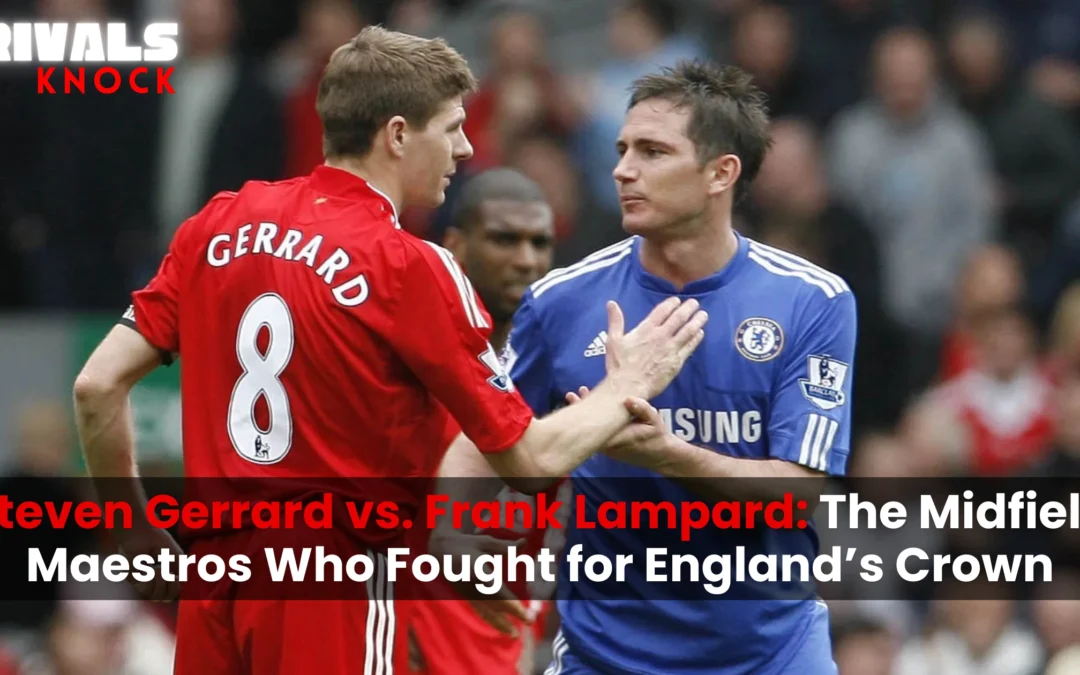It’s the early 2000s, and the Premier League is a battlefield. Manchester United and Arsenal might have ruled the roost a few years earlier, but now, two new giants are stepping into the spotlight—Liverpool and Chelsea. At the heart of this new rivalry are two midfielders who’d go on to define a generation: Steven Gerrard and Frank Lampard. For over a decade, these two English legends went toe-to-toe, not just for club glory but for the unofficial title of England’s greatest midfielder. Their story isn’t just about stats or trophies—it’s about passion, heartbreak, and a rivalry that still gets fans arguing over a pint. Let’s dive into their epic clash, break down the tactics, and relive the moments that made Gerrard vs. Lampard one of football’s most enduring debates.
The Stage Is Set: Two Clubs, Two Captains, One Crown
Steven Gerrard and Frank Lampard weren’t just players—they were the beating hearts of their clubs. Gerrard, born and bred in Liverpool, was the Scouse lad who carried the weight of Anfield on his shoulders from 1998 to 2015. Lampard, the London boy who became Chelsea’s golden son from 2001 to 2014, was the picture of consistency at Stamford Bridge. Both were captains, leaders, and goal-scoring midfielders who could do it all—pass, tackle, shoot, and inspire. But their rivalry wasn’t just about their clubs; it was about who’d claim the crown as England’s midfield maestro.
Between them, they played 22 times head-to-head in the Premier League. Lampard’s Chelsea edged it with nine wins, Gerrard’s Liverpool took six, and seven games ended in draws. But those numbers don’t tell the whole story. This was a battle of heart versus head, raw passion versus cool precision, a one-club man versus a record-breaking machine. Gerrard ended his Liverpool career with 120 Premier League goals and 92 assists in 504 appearances, while Lampard set the benchmark for midfielders with 177 goals and 102 assists in 429 games for Chelsea. Those stats alone show why they were giants—but it’s the moments on the pitch that made their rivalry legendary.
A Clash of Styles: Passion Meets Precision
Watching Gerrard and Lampard go at it was like watching two master craftsmen with completely different tools. Gerrard was the emotional warrior, the kind of player who’d drag Liverpool back from the brink with sheer will. He played with his heart on his sleeve, often dropping deep to win the ball, then charging forward to unleash a thunderbolt from 30 yards. Think of his iconic equalizer against West Ham in the 2006 FA Cup final—a 35-yard screamer in stoppage time to force extra time. That was Gerrard in a nutshell: clutch, fiery, and fearless. Tactically, he was a box-to-box dynamo, averaging 1.8 tackles and 1.5 interceptions per game in his prime (2005-06 season), while also creating 2.2 key passes per match. He could dictate play with long, raking passes—his 87% pass accuracy in 2008-09 was elite for a midfielder who took so many risks.
Lampard, on the other hand, was the thinking man’s midfielder. He didn’t have Gerrard’s raw power, but his football IQ was off the charts. Lampard mastered the art of arriving in the box at the perfect moment, often ghosting past defenders to tap in or rifle a shot from the edge of the area. His 2009-10 season, where he scored 22 goals and assisted 14, is the stuff of legend for a midfielder. Tactically, he was more disciplined than Gerrard, often sitting slightly higher up the pitch in Chelsea’s 4-3-3 under José Mourinho. Lampard averaged 1.2 tackles and 1.1 interceptions per game in that same 2009-10 season, but his real weapon was his finishing—his 15% shot conversion rate that year was better than most strikers. While Gerrard was the playmaker who’d break lines with a single pass, Lampard was the finisher who’d punish you if you gave him an inch.
Their contrasting styles made their battles electric. Gerrard would try to dominate the midfield with his physicality, pressing high to win the ball and spark a counter. Lampard, playing in a more structured Chelsea side, would focus on positional play, drifting into pockets of space to receive the ball and either shoot or link up with forwards like Didier Drogba. In their 2005 Champions League semifinal at Anfield, Gerrard’s relentless energy overwhelmed Chelsea’s midfield, leading to Luis García’s “ghost goal” in a 1-0 Liverpool win. But in 2009 at Stamford Bridge, Lampard got his revenge, scoring twice in a 4-4 thriller that knocked Liverpool out of the Champions League quarterfinals. That game summed up their rivalry: Gerrard’s Liverpool fought with heart, but Lampard’s cool head often tipped the scales.
The Big Moments: Heartbreak and Heroics
Some of the biggest moments in their rivalry came when the stakes were highest. Let’s rewind to May 3, 2005—Anfield, Champions League semifinal, second leg. Liverpool were trailing 1-0 from the first leg at Stamford Bridge, where Lampard had been a constant threat. But at Anfield, Gerrard turned the game on its head. He was everywhere—winning tackles, spraying passes, and driving his team forward. When García scored the controversial goal (did it cross the line? Chelsea fans still argue it didn’t), it was Gerrard’s leadership that saw Liverpool hold firm for a 1-0 win on the night, 1-1 on aggregate, advancing on away goals. Gerrard went on to lift the Champions League trophy that year after the miracle in Istanbul, a defining moment in his career—and one Lampard could only watch from afar.
Fast forward to April 14, 2009, and the tables turned. Chelsea and Liverpool met again, this time in the Champions League quarterfinals. The second leg at Stamford Bridge was pure chaos—eight goals, two comebacks, and a masterclass from Lampard. Liverpool took an early 2-0 lead, but Chelsea fought back, with Lampard scoring a stunning free-kick to make it 3-2 on the night, 4-4 on aggregate. Liverpool equalized again through Dirk Kuyt, but Lampard wasn’t done. In the 89th minute, he latched onto a loose ball and smashed it into the top corner, sealing a 4-3 win (7-6 on aggregate) for Chelsea. Gerrard, who’d been a menace all night, could only watch as his European dream slipped away. Lampard’s brace that night wasn’t just about goals—it was a statement: he could match Gerrard’s fire with ice-cold precision.
The Premier League had its own share of drama. In 2014, with Liverpool chasing their first title in 24 years, Gerrard’s infamous slip against Chelsea handed the ball to Demba Ba, who scored in a 2-0 Chelsea win. Lampard didn’t score that day, but he was part of the Chelsea side that derailed Liverpool’s title hopes, a moment that still haunts Gerrard. Lampard, meanwhile, had already won three Premier League titles (2004-05, 2005-06, 2009-10), a luxury Gerrard never tasted despite his heroics.
The England Conundrum: Heroes Apart, Struggles Together
If their club battles were epic, their time with England was a different story—one of frustration and what-ifs. Both were world-class for their clubs, but together, they never clicked. Gerrard earned 114 caps, Lampard 106, yet neither won a major trophy with the Three Lions. From 2004 to 2012, they were staples in England’s midfield, often playing in a 4-4-2 that didn’t suit either. Managers like Sven-Göran Eriksson and Fabio Capello tried pairing them, but their styles clashed—Gerrard’s all-action approach didn’t mesh with Lampard’s need for positional freedom. In the 2006 World Cup, England crashed out in the quarterfinals to Portugal, with both players missing penalties in the shootout. At Euro 2012, they started together in a 1-0 win over Ukraine, but England fell to Italy in the quarters—again on penalties.
The debate over why they couldn’t gel still rages. Some blame the managers for forcing a square peg into a round hole—Gerrard and Lampard both thrived as central figures at their clubs, but for England, they were often asked to play out of position. Others point to their similarities: both wanted to be the hero, to make the game-changing pass or score the decisive goal. In a 2023 interview, Lampard admitted, “We were too similar—both wanted to take control, and it didn’t always work.” Gerrard, in a 2024 podcast, countered, “We could’ve worked if the system was right. We were never given the chance to play with a proper No. 10 or holding midfielder.” Fans on X still argue over who should’ve been the centerpiece of that England team—a 2025 poll showed 53% backing Gerrard for his leadership, 47% favoring Lampard’s consistency.
Beyond the Pitch: A Rivalry That Endures
By the time Gerrard left Liverpool for LA Galaxy in 2015 and Lampard joined Manchester City in 2014 (before a stint at NYCFC), their rivalry had already cemented their legacies. Lampard’s trophy cabinet was fuller—three Premier League titles, a 2012 Champions League, and four FA Cups. Gerrard’s haul was lighter—a 2005 Champions League, two FA Cups, and three League Cups—but his loyalty to Liverpool, where he stayed despite interest from Chelsea in 2005, won him a different kind of respect. Gerrard’s 710 appearances for Liverpool made him a one-club icon, while Lampard’s 211 total goals for Chelsea remain a club record.
Today, both are still in football. Gerrard, managing Al-Ettifaq in Saudi Arabia as of May 2025, is trying to build on his 2022 Scottish Premiership title with Rangers. Lampard, now a pundit after managerial stints at Chelsea and Everton, remains a voice of reason on TV, often reflecting on their rivalry with a smile. In a 2024 Sky Sports segment, Lampard said, “Stevie was a nightmare to play against—those long balls, that energy. But I loved the challenge.” Gerrard, speaking on a 2025 podcast, returned the compliment: “Frank was so clever, always in the right place. You had to be on your game every second.”
What Made It Special: A Rivalry of Respect
What set Gerrard vs. Lampard apart wasn’t just their battles—it was the respect beneath the rivalry. They pushed each other to be better, raising the bar for what a midfielder could be in the Premier League. Gerrard’s never-say-die spirit inspired a generation of players, while Lampard’s consistency showed that hard work could turn talent into greatness. They weren’t enemies like Keane and Vieira, with tunnel bust-ups and red cards. Their rivalry was quieter but no less intense—a duel between two men who knew they’d be judged against each other for the rest of their careers.
Looking back, their rivalry feels like a relic of a different era. Today’s Premier League is faster, more technical, but it lacks the emotional stakes of Gerrard and Lampard’s battles. Could a modern midfielder—like Kevin De Bruyne or Rodri—carry the same weight? Maybe, but the magic of Gerrard vs. Lampard was in the context: two English captains, two historic clubs, and a nation watching to see who’d come out on top.
So, Who Was Better?
Here’s the question that’ll never die: Gerrard or Lampard? If you judge by trophies, Lampard wins hands down. If you value loyalty and clutch moments, Gerrard takes it. Tactically, Gerrard was the more dynamic player, capable of turning a game single-handedly with a tackle, pass, or screamer. Lampard, though, was the more reliable, a machine who’d deliver 15 goals and 10 assists a season without breaking a sweat. For England, neither cracked it—but that says more about the team than the players.
I’ll leave it to you to decide. Who’d you pick in their prime—Gerrard’s fire or Lampard’s ice? Drop your thoughts on X with #GerrardVsLampard, and let’s get the debate going! While you’re at it, check out our recent piece on the Europa League final—Tottenham’s grit might just remind you of a certain Scouse midfielder. Stay tuned to Rivals Knock for more stories from football’s greatest rivalries!

